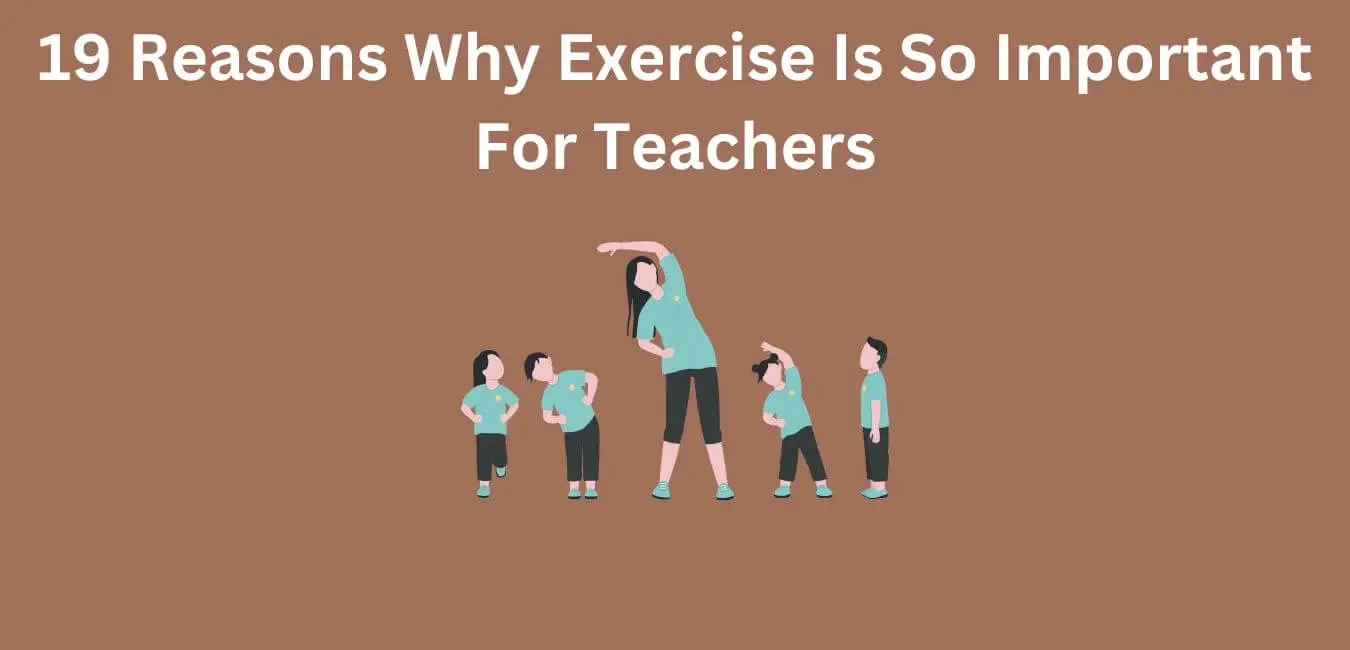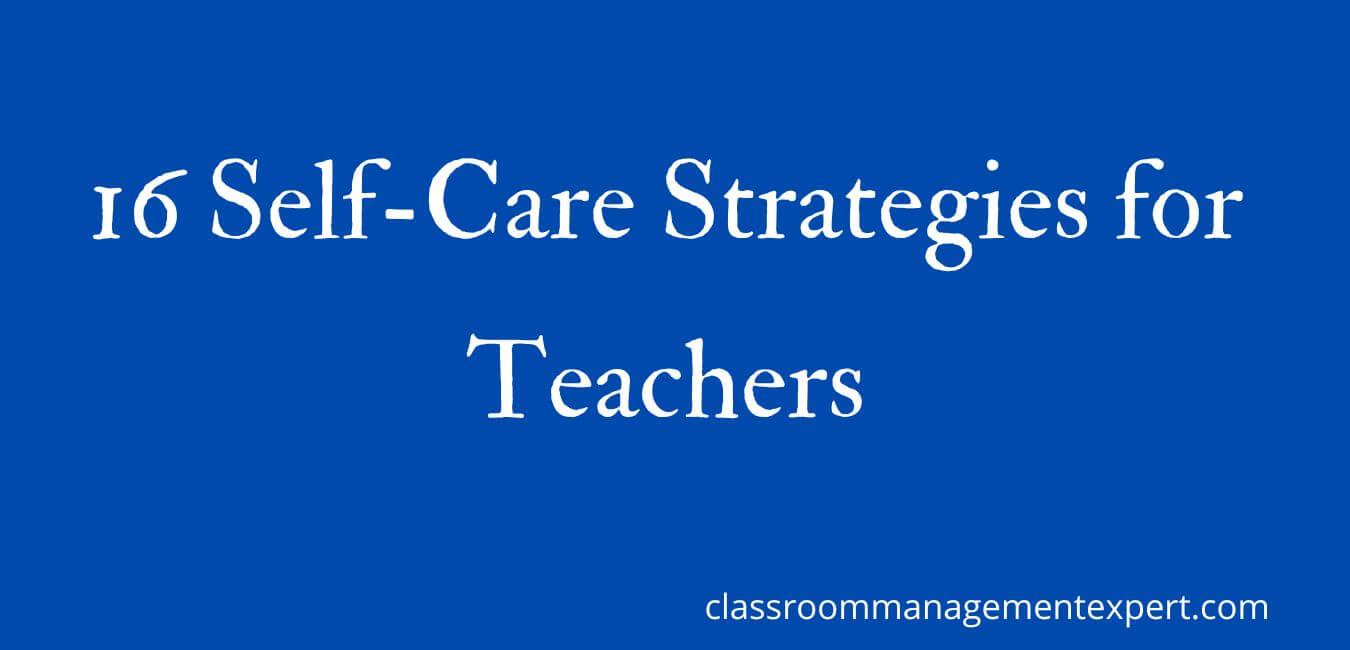You might be thinking, ‘Exercise is just one more thing to add to my already jam-packed schedule as a teacher.’ But let me tell you, prioritizing exercise is absolutely essential for your well-being and success in the classroom. In fact, there are 19 compelling reasons why exercise should be at the top of your to-do list.
First and foremost, exercise boosts your physical health, keeping you strong and able to handle the demands of your job. It also enhances your mental health, reducing stress and increasing your energy levels.
Plus, exercise improves your focus and concentration, helping you to be more present and engaged with your students. And let’s not forget about the countless benefits exercise has for your overall resilience and work-life balance.
So, while it may seem like just another item on your never-ending to-do list, incorporating regular exercise into your routine will undoubtedly make you a better teacher, both in and out of the classroom.
Key Takeaways
- Exercise improves physical health and energy levels, allowing teachers to perform their duties with vitality.
- Regular physical activity enhances cognitive function, focus, and attention, leading to improved classroom performance.
- Exercise releases endorphins and reduces stress, promoting better mood and overall well-being for teachers.
- Prioritizing exercise sets a positive example for students, encouraging them to prioritize their own health and well-being.
Why Exercising Important for You and Me as Teachers
1. Boosting Physical Health
You’ll find that incorporating exercise into your routine as a teacher not only enhances your physical well-being, but also contributes to an overall improvement in your health. Regular exercise has numerous benefits for your physical health.
It helps to maintain a healthy weight, strengthens your muscles and bones, and reduces the risk of chronic diseases such as heart disease and diabetes. By engaging in physical activities like jogging, cycling, or dancing, you can improve your cardiovascular fitness, which in turn increases your stamina and energy levels.
Physical fitness is crucial for teachers as they spend long hours on their feet, constantly moving and interacting with students. Being physically fit allows you to perform your job with ease and efficiency. It helps you to stay alert and focused, as exercise promotes the release of endorphins, which are natural mood boosters. Regular exercise also improves sleep quality, so you wake up feeling refreshed and ready to tackle the day ahead.
In addition to the physical benefits, exercise is also essential for your mental health. It reduces stress and anxiety levels, providing you with a sense of calm and relaxation. Engaging in physical activities allows you to take a break from the demands of teaching, giving you time to recharge and rejuvenate. It also fosters a positive body image and boosts self-confidence, which can have a positive impact on your overall well-being.
Incorporating exercise into your routine as a teacher is not only beneficial for your physical and mental health but also for your overall quality of life. So why wait? Start prioritizing your well-being by incorporating regular exercise into your daily schedule. You deserve to live a healthy and fulfilling life.
2. Enhancing Mental Health
By incorporating regular physical activity into your routine, you can significantly improve your mental well-being and overall quality of life. Exercise not only benefits your physical health but also enhances your mental health. Regular participation in physical activity has been shown to have numerous positive effects on mental health.
Exercise improves mental health by reducing symptoms of anxiety and depression. It releases endorphins, which are natural mood boosters. When you exercise, you also increase blood flow to the brain, improving cognitive function and memory. This can lead to better focus and concentration, allowing you to be more present in your teaching.
Incorporating physical activity into your daily routine can also have a positive impact on your academic performance. Exercise has been linked to improved creativity and problem-solving abilities. It can also help reduce stress, which can often hinder your ability to perform at your best.
To enhance your mental health through exercise, consider the following:
- Engage in activities you enjoy, such as dancing, hiking, or playing a sport.
- Set realistic goals and track your progress.
- Find a workout buddy or join a fitness class to make it more enjoyable.
- Take breaks throughout the day to move and stretch.
- Prioritize self-care and make time for regular physical activity.
Remember, taking care of your mental health is just as important as taking care of your physical health. Incorporating exercise into your routine can have a profound impact on your well-being and overall happiness.
3. Increasing Energy Levels
Boost your energy levels by incorporating regular physical activity into your routine. Engaging in aerobic exercises and increasing your physical activity can significantly enhance your energy levels throughout the day. When you make exercise a regular part of your life, you’ll experience a surge in vitality and feel more alert and focused in the classroom.
Regular physical activity delivers oxygen and nutrients to your tissues, helping your cardiovascular system work more efficiently. This results in improved energy levels and increased stamina. Additionally, exercise stimulates the production of endorphins, which are natural mood-enhancers that can combat feelings of fatigue and boost your overall well-being.
To highlight the benefits of physical activity on energy levels, here’s a table showcasing the positive effects:
| Benefits of Regular Physical Activity |
|---|
| Increased energy levels |
| Enhanced mental clarity |
| Improved mood |
| Reduced feelings of fatigue |
| Increased productivity |
Incorporating regular exercise into your routine allows you to break free from the constraints of low energy levels and experience the freedom of a more vibrant and energized life. So, don’t hesitate to start increasing your physical activity today!
4. Reducing Stress
Take a moment to explore the impact of stress reduction on your overall well-being and discover the profound benefits it can have on your daily life. As a teacher, you know that the demands of your profession can sometimes be overwhelming. However, incorporating regular exercise into your routine can significantly reduce stress levels and improve your mental health.
Engaging in physical activity through exercise releases endorphins, which are natural mood boosters. These endorphins help to alleviate feelings of anxiety and depression, reducing the risk of mental health problems. By making exercise a priority, you are actively taking steps to protect your brain health and promote a positive mindset.
Exercise not only provides a temporary relief from stress, but it also helps to build resilience in the long run. Regular exercise can train your body to handle stress more effectively, allowing you to better cope with the challenges that come your way. This can lead to a greater sense of control and empowerment in your life.
By incorporating exercise into your daily routine, you are investing in your own well-being. Take the time to prioritize your physical and mental health, and watch as the stress melts away. Remember, you have the power to take control of your life and create the freedom and balance you desire.
5. Improving Focus and Concentration
Improving focus and concentration can greatly enhance your ability to meet the demands of your profession as a teacher. As an educator, you are constantly juggling multiple tasks and responsibilities throughout the day.
Engaging in regular physical exercise, such as physical education classes or other forms of exercise, can have a significant impact on your mental capabilities. Exercise builds your brain and improves your cognitive functions, making it easier for you to process information and retain knowledge. When you exercise, your brain releases chemicals that enhance your mood and boost your ability to learn.
This means that incorporating exercise into your daily routine can help you stay alert and focused during your busy school day. Not only does exercise benefit your mental capacities, but it also has physical benefits. Regular physical activity improves blood flow to the brain, which can enhance your cognitive abilities. Additionally, exercise increases the production of neurotransmitters that are responsible for memory and attention.
By incorporating exercise into your routine, you can improve your ability to concentrate and stay focused on the tasks at hand. This will ultimately benefit both you and your students, as you will be able to provide them with the attention and support they need to succeed. So, make physical and mental fitness a priority and see the positive impact it has on your teaching abilities.
6. Fostering Creativity
Now that you understand the importance of improving focus and concentration through exercise, let’s delve into another crucial benefit: fostering creativity.
Regular participation in physical activity not only enhances your physical health but also has a positive impact on your mental well-being. As a teacher, you constantly strive to inspire and engage your students, and fostering creativity is a key aspect of that.
Engaging in physical exercise allows you to break free from the constraints of your daily routine, giving you the freedom to explore new ideas and perspectives. It stimulates your brain, boosts your cognitive abilities, and helps you think outside the box.
To fully grasp the significance of this, consider the following four health benefits of physical activity:
- Increased blood flow to the brain, promoting mental clarity and creativity.
- Release of endorphins, enhancing your mood and overall sense of well-being.
- Reduction of stress and anxiety levels, allowing for a more relaxed and open mindset.
- Improvement in problem-solving skills, as physical exercise challenges your brain to find innovative solutions.
By incorporating exercise into your daily routine, you create an environment that nurtures your creativity and allows for limitless possibilities in your teaching approach. So, don’t hesitate to prioritize your physical and mental health through regular exercise, and watch the positive impact it has on your teaching abilities.
7. Enhancing Mood
Engaging in regular physical activity can significantly boost your mood and overall sense of well-being, leaving you feeling like a breath of fresh air. Exercise is not just about getting in shape or losing weight; it has a profound impact on your mental health as well.
When you exercise, your body releases endorphins, which are known as the ‘feel-good’ hormones. These endorphins help enhance your mood and reduce feelings of stress and anxiety.
Regular exercise also improves cognitive functioning, allowing you to think more clearly and be more productive in your work as a teacher. It helps increase blood flow to the brain, promoting the growth of new brain cells and improving memory and concentration. By incorporating exercise into your routine, you can enhance your ability to learn and retain information, which can be incredibly beneficial in the classroom.
Furthermore, exercise has been proven to alleviate symptoms of depression. It can act as a natural antidepressant, helping to reduce feelings of sadness and boost your overall mental well-being. By engaging in physical activity, you can experience a sense of accomplishment and empowerment, which can counteract negative thoughts and feelings.
In conclusion, exercise is not just important for physical health, but it also plays a crucial role in enhancing mood and overall mental well-being. By incorporating regular exercise into your routine, you can experience the many benefits it offers, including improved cognitive functioning and a reduction in symptoms of depression. So, take some time for yourself and engage in physical activity – your mind and body will thank you.
8. Promoting Better Sleep
Getting a good night’s sleep is essential for feeling refreshed and energized throughout the day. As a teacher, incorporating physical activities into your exercise program can greatly promote better sleep.
By engaging in regular exercise, you not only improve your physical health, but also your mental well-being. This, in turn, can have a positive impact on your sleep patterns.
When you participate in physical activities, such as jogging or yoga, your body releases endorphins, which are natural mood boosters. These endorphins can help reduce stress and anxiety, allowing you to unwind and relax before bed. Additionally, exercise can tire your body, making it easier for you to fall asleep and stay asleep throughout the night.
Promoting better sleep through exercise is especially important for teachers because it can have long-term benefits for both you and your students. Research has shown that improvements in academic performance have been linked to better sleep patterns. By prioritizing your own sleep health, you are setting a positive example for your students and encouraging them to do the same.
Incorporating physical activities into your exercise program not only benefits your overall health and well-being, but it can also positively impact your sleep. By getting a good night’s sleep, you will be better equipped to handle the demands of your teaching profession and provide your students with the best education possible.
So, make exercise a priority in your daily routine and reap the long-term benefits it can bring to your sleep and overall health.
9. Setting a Good Example for Students
By prioritizing your own sleep health, you’re setting a positive example for your students and encouraging them to do the same. As a teacher, you have the power to influence your students not only academically but also in terms of their overall well-being. When you make sleep a priority in your own life, you send a strong message to your students about the importance of getting enough rest.
In order to help your students understand the significance of sleep, you can integrate discussions about sleep hygiene and the benefits of a good night’s sleep into your physical education class. By incorporating these topics into your curriculum, you are equipping your students with knowledge and tools to prioritize their own sleep health.
Not only does prioritizing sleep set a good example for your students, but it also creates a positive school environment. When teachers show that they value sleep and make efforts to get enough rest, it sends a message to the entire school community that sleep is important and should be respected.
Furthermore, by prioritizing sleep and taking care of your own physical and mental well-being, you are better equipped to handle the challenges of the classroom. When you are well-rested, you have the energy and focus to effectively manage classroom behavior and create a positive learning environment.
| Pros of Setting a Good Example for Students | Cons of Not Prioritizing Sleep |
|---|---|
| Encourages students to prioritize sleep | May lead to increased stress |
| Creates a positive school environment | Can negatively impact health |
| Enhances classroom behavior and focus | Decreases overall well-being |
In conclusion, by setting a good example for your students and prioritizing your own sleep health, you are not only benefiting yourself but also creating a positive impact on the school environment, integrating physical activity into your classroom, and promoting better classroom behavior. Remember, your actions speak louder than words, and by valuing sleep, you are teaching your students the importance of taking care of their overall well-being.
10. Improving Classroom Performance
Improving classroom performance can be achieved by prioritizing sleep and ensuring that students have enough rest. However, another important factor that can significantly enhance classroom performance is regular exercise. Engaging in physical activity has been found to have numerous benefits for both teachers and students. Here are five reasons why exercise is so important for teachers:
- Increased focus and attention: Regular exercise has been shown to improve cognitive function, which can help teachers stay focused and attentive in the classroom.
- Enhanced creativity: Physical activity stimulates the brain and promotes the production of endorphins, which can boost creativity and problem-solving skills.
- Reduced stress levels: Teaching can be a stressful profession, but exercise can help alleviate stress and promote a sense of well-being.
- Improved physical health: Regular exercise can improve cardiovascular health, increase energy levels, and reduce the risk of chronic diseases, allowing teachers to perform their duties with vitality.
- Positive role modeling: Incorporating physical activity into their own lives allows teachers to serve as positive role models for their students, encouraging them to prioritize their own health and well-being.
By incorporating regular exercise into their routines, teachers can not only improve their own classroom performance but also promote a culture of active learning and well-being among their students.
Physical activity interventions and physical education programs can be effective strategies to enhance classroom performance, especially for students with attention deficit hyperactivity disorder. So, don’t underestimate the power of exercise in creating a productive and engaging learning environment.
11. Increasing Productivity
Incorporating regular exercise into your routine can significantly increase productivity for teachers. Just take a look at the case study of Ms. Johnson, a high school teacher who found that her energy levels and focus improved after implementing a daily exercise routine. By engaging in physical activity, you can reap numerous benefits that directly impact your productivity in the classroom.
Exercise can help you stay alert and focused throughout the day, allowing you to effectively manage your workload and engage with your students. It also helps reduce stress levels, which can often be high in the teaching profession. When you exercise, your body releases endorphins, which are natural mood boosters that can enhance your overall well-being and make you feel more motivated.
To help you understand the positive impact of exercise on productivity, take a look at the table below:
| Productivity Factors | Sedentary Lifestyle | Active Lifestyle |
|---|---|---|
| Energy Levels | Low | High |
| Focus | Easily Distracted | Sharp |
| Stress Levels | High | Low |
| Motivation Levels | Low | High |
As a teacher, it’s important to prioritize your own well-being and find ways to increase your productivity. Incorporating exercise into your routine can be a game-changer, providing you with the energy and focus needed to excel in your profession. So, take a break, get moving, and unlock your full potential as an educator.
12. Encouraging a Healthy Lifestyle
Encouraging a healthy lifestyle can be a transformative journey for you as an educator. By prioritizing your well-being, you will discover the power it holds in enhancing your overall quality of life.
Physical activity programs play a vital role in promoting a healthy lifestyle for teachers and school children alike. Exercise has numerous benefits, both physically and mentally. It helps to combat the sedentary nature of teaching, where you spend long hours sitting or standing in front of a classroom.
Engaging in regular exercise not only improves your physical health but also boosts your energy levels, making you more alert and focused during the school day. By incorporating exercise into your daily routine, you set an example for your students and create a positive school culture centered around well-being.
When children see their teachers valuing and prioritizing physical activity, they are more likely to adopt healthy habits themselves. This can lead to improved academic performance, as studies have shown that regular exercise enhances cognitive function and memory.
Overall, encouraging a healthy lifestyle through exercise empowers you as an educator to take control of your well-being. By incorporating physical activity into your daily routine and fostering a school culture that values and promotes exercise, you can inspire your students to adopt healthy habits that will benefit them throughout their lives.
13. Enhancing Self-Confidence
Boost your self-confidence by embracing new challenges and stepping outside of your comfort zone. Exercise has a profound impact on your self-confidence, allowing you to break through barriers and achieve personal growth. Here are five reasons why exercise is essential for enhancing your self-confidence:
- Increased hippocampus growth: Regular exercise has been shown to stimulate the growth of the hippocampus, the part of the brain responsible for learning and memory. By exercising, you can improve your cognitive abilities, boost your self-esteem, and feel more confident in your ability to handle new challenges.
- Positive effects on mood: Exercise releases endorphins, the feel-good hormones that can elevate your mood and reduce stress and anxiety. When you feel happier and more relaxed, your self-confidence naturally improves, allowing you to approach tasks with a positive mindset.
- Improved physical well-being: Being physically active not only improves your overall health but also enhances your body image. Regular exercise helps improve muscle tone, posture, and overall strength, giving you a greater sense of physical self-assurance.
- Enhanced mental resilience: Exercise helps you develop mental resilience by pushing you to overcome physical limitations. As you challenge yourself physically, you develop a sense of inner strength and resilience that translates into increased self-confidence.
- Greater sense of accomplishment: Achieving fitness goals, whether it’s running a marathon or mastering a new yoga pose, provides a sense of accomplishment. These small victories build your self-confidence and show you that you are capable of achieving greatness.
By incorporating regular exercise into your routine, you can boost your self-confidence and become a more empowered and confident teacher. Embrace the power of exercise and watch your self-confidence soar.
14. Supporting Emotional Well-being
Now that we have explored how exercise can enhance your self-confidence, let’s delve into another important aspect of exercise for teachers – supporting your emotional well-being. Taking care of your emotional health is vital, as it directly affects your overall well-being and ability to manage stress in the classroom.
Engaging in regular exercise, such as recess or participation in sports, can have a significant impact on your emotional well-being. Studies show that physical activity stimulates the release of endorphins, also known as “feel-good” hormones, which can boost your mood and reduce feelings of stress and anxiety. It’s like a natural remedy for your emotional ups and downs!
To help you understand the benefits of exercise for your emotional well-being, let’s take a look at this three-column table:
| Emotional Well-being Benefits of Exercise | Studies Show | Additional Impact |
|---|---|---|
| Boosts mood and reduces stress and anxiety | Yes | Endorphins |
| Increases self-esteem and self-worth | Yes | Achievements |
| Enhances emotional resilience | Yes | Coping skills |
As you can see, exercise not only supports your emotional well-being but also helps build emotional resilience and enhances your coping skills. So, make sure to prioritize exercise in your daily routine to nourish your emotional freedom and maintain a positive mindset in and out of the classroom.
15. Promoting Longevity
To help you live a long and healthy life, it’s time to focus on how you can promote longevity through regular physical activity. Incorporating exercise into your daily routine has numerous benefits that can enhance your overall well-being and increase your lifespan. Here are three key reasons why exercise is vital for promoting longevity:
- Improve your body mass index (BMI): Regular exercise helps you maintain a healthy weight, which is crucial for longevity. By engaging in aerobic activities like running or swimming, you can burn calories and reduce excess body fat. This can lead to a lower BMI, reducing the risk of obesity-related illnesses and increasing your chances of living a longer, healthier life.
- Reduce the risk of coronary heart disease: Exercise increases your heart rate and strengthens your cardiovascular system. This helps lower the risk of developing coronary heart disease, a condition that can be life-threatening. By engaging in regular aerobic activity, you can improve your heart health and reduce the chances of experiencing heart-related issues.
- Associated with better overall health: Regular exercise is associated with better overall health and a reduced risk of chronic diseases. It can improve your immune system, enhance mental health, and boost your energy levels. By incorporating exercise into your daily routine, you can improve your quality of life and increase your chances of enjoying a long and fulfilling journey.
Remember, by prioritizing regular exercise, you are taking proactive steps towards promoting longevity and ensuring a healthier future for yourself. Embrace the freedom of movement and make physical activity a part of your daily life.
16. Fighting Off Illness
Maintaining a strong immune system is crucial for warding off illness and ensuring you stay healthy, even in the face of the most vicious germs and viruses. As a teacher, it’s essential to prioritize your health so you can continue to inspire and educate your students.
One way to boost your immune system is through regular exercise. Research has shown that engaging in moderate to vigorous exercise regularly can help strengthen your body’s defense against diseases. A study published in the Journal of the American Medical Association found that individuals who exercise regularly have a lower risk of developing chronic diseases such as heart disease, diabetes, and even certain types of cancer. Another health survey conducted by the Centers for Disease Control and Prevention reported that adults who engage in regular physical activity have a reduced risk of acquiring infectious diseases, such as the flu or common cold.
Exercise not only improves your body weight and overall physical health but also plays a significant role in disease control and prevention. By engaging in regular physical activity, you can enhance your immune system’s ability to fight off harmful pathogens and reduce the chances of falling ill.
So, make exercise a priority in your life and stay healthy to continue making a positive impact on the lives of your students.
17. Enhancing Cognitive Function
Boost your cognitive function by incorporating regular physical activity into your routine. Exercise is a powerful tool that can help you achieve this goal.
Engaging in physical activity has been proven to have a positive impact on cognitive function. When you exercise, your brain receives increased blood flow and oxygen, which helps improve its overall performance. This enhanced cognitive function allows you to think more clearly, solve problems more effectively, and make better decisions.
Exercise has also been shown to increase the production of neurotransmitters, such as dopamine and serotonin, which are responsible for regulating mood and reducing stress. By engaging in regular physical activity, you can enhance your cognitive function and better manage the challenges and stressors you face as a teacher on a daily basis. This can lead to improved mental well-being.
Don’t underestimate the power of physical activity in enhancing your cognitive function. Make time in your busy schedule to incorporate exercise into your routine. Whether it’s going for a jog, attending a fitness class, or even taking a brisk walk during your lunch break, find an activity that you enjoy and stick with it. Your brain will thank you for it!
18. Building Resilience
Developing resilience is crucial for teachers, as it allows you to bounce back from challenges, adapt to change, and thrive in the face of adversity. Research shows that engaging in regular physical activity can greatly contribute to building resilience. Here are some reasons why exercise is so important for teachers:
- Exercise helps in building resilience, enabling teachers to handle stress effectively.
- Engaging in a variety of activities such as jogging, yoga, dancing, or swimming can help release endorphins, reduce stress, and improve overall well-being.
- Sedentary lifestyles have been linked to increased stress levels and decreased resilience. Regular exercise can counteract these negative effects.
- Studies have found that teachers who engage in regular physical activity are better equipped to handle the demands of their profession, resulting in increased job satisfaction and decreased burnout rates.
- Physical activity has been shown to improve cognitive function, boost mood, and enhance problem-solving skills, all of which are crucial in building resilience.
By incorporating exercise into your daily routine, you can enhance your ability to handle the challenges that come your way, adapt to changes in the education system, and ultimately thrive as a teacher.
So, make sure to prioritize your physical well-being and reap the benefits it brings to your resilience and overall happiness.
19. Supporting Work-Life Balance
By prioritizing work-life balance, you can create a harmonious and fulfilling lifestyle that promotes overall well-being and success. One of the key ways to support work-life balance is through incorporating vigorous exercise into your routine.
Exercise not only benefits your physical health, but it also has a positive impact on your mental and emotional well-being. Finding time in the school day for exercise may seem challenging, but it is crucial for your ability to focus and perform at your best. Engaging in physical activity releases endorphins, which can boost your mood and increase your energy levels. This can help you feel more motivated and productive throughout the day.
Moreover, exercise provides a much-needed break from the demands of your job. It allows you to step away from the classroom and focus on yourself, which is essential for maintaining a healthy work-life balance. Taking time for yourself and engaging in activities that you enjoy can help reduce stress and prevent burnout.
By prioritizing exercise and supporting work-life balance, you are setting yourself up for long-term success as a teacher. Remember, taking care of yourself is not selfish; it is necessary for you to be the best teacher you can be. So, make sure to carve out time for vigorous exercise and watch how it positively impacts your overall well-being and ability to thrive both inside and outside the classroom.
Conclusion
In conclusion, as a teacher, you have countless reasons to prioritize exercise in your life. Here are 19 reasons why exercise is so important for teachers:
- Boosts physical health.
- Enhances mental health.
- Increases energy levels.
- Reduces stress.
- Improves focus and concentration.
- Enhances cognitive function.
- Builds resilience.
- Promotes a better work-life balance.
- Increases productivity.
- Enhances creativity.
- Improves sleep quality.
- Reduces the risk of chronic diseases.
- Boosts immune system.
- Increases self-confidence.
- Promotes positive body image.
- Improves posture.
- Enhances cardiovascular health.
- Helps maintain a healthy weight.
- Sets a positive example for students.
So, lace up those sneakers and let exercise be your guiding light on this incredible teaching journey.


















